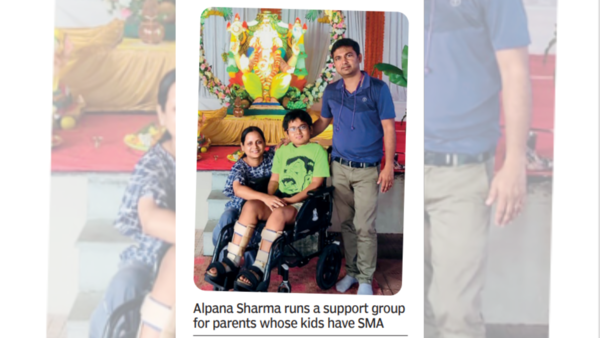Why parents of children with rare genetic diseases have turned activists | India News

[ad_1]
Shirol’s daughter Nidhi was born in 1999, but it was only eight years later that doctors managed to diagnose her with Pompe disease. “Within the first few months, we understood something was wrong. She was very weak and thin and would have frequent bouts of pneumonia. Doctors later told us that it was incurable,” he recalls. Shirol and his wife spent years researching Nidhi’s condition in medical journals and carrying reports from one medical specialist to another. He refused promotions at work to prioritise Nidhi’s care and used advocacy to get her accepted in a clinical trial. “I used my savings, took out loans, and borrowed from friends for her treatment. In the process, I realised that it is extremely hard to do this alone,” he says. He first started a parent support group and then in 2014, he established the Organisation for Rare Diseases India (ORDI) that has worked on sensitising the government on rare diseases, approaching courts and pharma companies for price control on exorbitant drugs. Mumbai resident Alpana Sharma too recognised the power of a collective. Nine months after her son Aarav’s birth in 2012, he was diagnosed with Spinal Muscular Atrophy (SMA). “Our world was shattered. My pillow would be drenched with tears every night as I sat up thinking about the future. It was a very dark period. I kept thinking ‘why me’ ‘why my child’,” says the former professor of business management and communications.
SMA is an extremely rare degenerative genetically inherited neuromuscular disease that affects children and adults. It results in weakness and wasting muscles that worsens with age. On the insistence of her family that has many doctors, she attended an SMA conference in the US. “The room was filled with people who had SMA but were doctors and lawyers. I finally saw hope,” she says. She also saw how an SMA support group helped people find the right doctors and treatments. “I came back to India in 2014 and started a Facebook page. Five families joined me. Today, there are 1,200 members connected to the support group CureSMA Foundaton of India,” she says.

Treatment and management of these rare diseases is a challenge but so is the stigma associated with them. Many well-meaning relatives and neighbours have offered unsolicited advice like “try for another child” to opinions like the child is “pichle janam ka paap” (a curse from a previous birth) to prayers and totems from babas and fakirs.
India defines rare disease as a health condition that affects a small number of people. Low prevalence also means lack of awareness among medical practitioners, low testing and high cost of treatment, that is often not even available in India. Ironically, rare diseases are not that rare as collectively they impact 6-8% of the population. One in 20 Indians or an estimated 7 crore people are affected by them, and even more worryingly there is a 40% chance of error in diagnosis during the first doctor visit, according to government data.
Genetic testing is not mandatory or even available in many parts of the country nor is prenatal screening prioritised. Businessman Vikas Bhatia, 53, has faced the consequences of this. Between 1998-2010, he had three sons, all born with a metabolic disorder called Pyruvate Carboxylase Deficiency. All three died in infancy. Despite this triple tragedy, the Jaipur-based Bhatia and his wife decided to work towards creating awareness as they realised how important early treatment is in stopping the spread of the disease and saving the child. He started the Metabolic Errors and Rare Diseases Organisation of India (MERD India). Over the years, its awareness campaigns have helped diagnose over 100 children. “We act as a bridge between doctors and patients,” he says. Bhatia has also been actively campaigning for mandatory genetic testing and prenatal screening. Some diseases are even harder to detect than others. Like Prader-Willi syndrome (PWS) where children only show symptoms of weakness. It is a genetic disorder that can cause life-threatening obesity, basically a patient can eat themselves to death. Methramani says, “This is a challenging disorder because children with PWS don’t look like special children. It is not a visible disability, but it is very hard to control. The child is trying to control addiction like alcohol and drugs, except food is easily available everywhere. There is no cure but there are ways to manage the disease with growth hormone therapy, diet management, and exercise. ”
Even when there are drugs, they can be prohibitively expensive or not available in India. For instance, there are only three drugs that have proven to be lifesaving and life-altering treatments for SMA. Of these, one injection can cost as much as Rs 16.5 crore. The only drug available in India costs Rs 72 lakh a year for the first two years, and then Rs 56 lakh for subsequent years. It took months of advocacy by CureSMA Foundation of India to get approval for sale of the drug in India. The group has also succeeded in convincing the Kerala government to set up a medical board and put in place a first-of-its-kind initiative to provide free treatment to children impacted by SMA in the state. Under the scheme, about 40 children are receiving drugs, surgery, and therapy. In 2014, with the advocacy of several parent groups including ORDI, the Delhi high court asked the state government to provide free treatment to a rickshaw-puller’s son who was suffering from Gaucher’s disease. In 2016, ORDI helped parents whose children are affected by Lysosomal Storage Disorder move court for free treatment from the Karnataka government. A landmark moment for these organisations was when the government brought in a policy for rare diseases – operational since 2021 – which recognises the burden of treatment costs and makes provisions for government grants and crowdsourcing of funds. But there are more setbacks than successes. CureSMA Foundation tried to get GST exemption for a drug available in the Indian market, but the plea was rejected by the Supreme Court. Yet these parents refuse to give up.
#parents #children #rare #genetic #diseases #turned #activists #India #News





